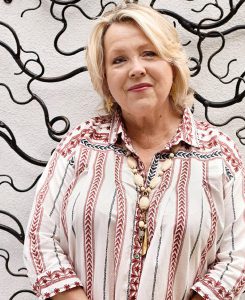How to keep your crowning glory at its fabulous best, by Alex Gazzola
How to keep your crowning glory at its fabulous best, by Alex Gazzola The strains of modern life may sometimes make you feel like tearing your hair out – but too much stress and your head could start to shed itof its own accord.
Although most of us associate hair loss with men, up to a quarter of women experience some kind of hair loss too. While men may get gently teased and have the easy and often stylish option of shaving what’s left of their hair completely off,women’s hair loss is more often treated as a taboo subject, and few women are bold enough to take a pair of clippers to their heads. Gail Porter may have faced up to her hair-loss issues with great dignity and openness, but many women suffer in silence and don’t seek help –even though there are a number of treatable causes for female alopecia, and a number of natural approaches which can help too.
At the core of a lot of hair loss are hormonal issues, says hormone and holistic health specialist, Dr Alyssa Burns-Hill (alyssaburns-hill.com ). “Lots of people get confused about hormones, and think only women have them and that they’re related only to reproduction,pregnancy and the menopause,” she says. “But there are lots of hormones and hormonal issues that are are common, even outside these particular phases of a woman’s life.”
“The stress hormone cortisol is one of the main ones,” she adds. “Plus thyroid function can be dramatically impacted by stress in a woman’s life because cortisol can interfere with thyroid hormones, so that even if your glands aren’t failing you can still suffer from thyroid-related issues directly caused by stress – including weight gain, fuzzy thinking, memory lapses,depression, anxiety and, yes, hair loss.Pregnancy and menopause – if they apply to you– are only a small part of all of the hormonal and stress ‘package’.”
Identifying that you have a problem may not always be easy if there is a mild generalised hair loss. A certain amount of noticeable daily hair loss is natural, but Alyssa says that if you’re noticing more hair than usual accumulating in your hair brush, around your dressing table, in the bathroom and in the plughole, there may bean issue.
Taking action
Spotting specific patches of hair loss is of course easier, as is more widespread hair loss, but some women may also experience receding at the temples, which mirrors male-pattern baldness and is common in women with polycystic ovarian syndrome (PCOS), as they have higher levels of androgenic (male) hormones than normal. “For some women, seeing their GP is the first natural step,” says Alyssa. “It’s worth doing if you have a persistent problem, to make sure nothing untoward is going on, such as an autoimmune disease or a particular scalp condition,which a referral to a dermatologist may be able to diagnose. It’s important to rule out reasons such as these, and any medication or drugs you are taking, including the Pill, which can be a factor.”
Once other options have been considered and ruled out, hormonal testing can help identify thyroid, stress or testosterone issues, and addressed with supplemental and nutritional support, says Alyssa.
“To take one example, if polycystic ovary syndrome and male-pattern hair loss has been identified, and the lady concerned had high testosterone, we can address that specifically,”she explains. “We could mitigate the effects of testosterone by helping the liver process the hormone out of the system. A liver detox can work– the supplement calcium d-glucarate can help.”
Mane ingredients
Further dietary changes can also support your hair and tackle underlying stress or hormonal issues that may be contributing to loss of hair. Zinc is one important mineral, according to Jenny Bodeman, nutritionist at Higher Nature (highernature.co.uk ). “Studies have shown that both low and excessive intake of zinc may result in hair loss, and that zinc can be depleted by high stress levels,” she says. “Ensure good dietary intake by munching on pumpkin seeds and nuts such as Brazils, walnuts and almonds, as well as including beans,oysters, mussels and wholegrains in your diet.”
It’s also vital to ensure your intake of omega 3 fatty acids is high.Cold-water, oily fish such as mackerel, sardines and salmon are good sources; vegan option are flaxseed oil and walnuts. Part of the reason these are beneficial may be due to their anti-inflammatory qualities,which tackle any inflamed hair follicles.Turmeric, too, has these qualities, adds Jenny. She says: “Not only does it add a delicious flavour to cooking, but it is rich in polyphenolic compounds known as curcuminoids which help support anti-inflammatory processes in the body.”
Time to de-stress
What else can help? “From the point of view of depression and anxiety I often use 5-HTP – an amino acid which converts to serotonin, the‘happy hormone’,” says Alyssa Burns-Hill.
All experts say that scalp massage can be good – both as a relaxant and to encourage blood flow to the area, to help ‘feed’ the follicles.“And choose organic hair and skincare products too,” says Emma Alessandrini. “The skin is very permeable, and quite thin on the scalp, and so will absorb a lot. It definitely matters.”
Herbal helpers
Herbs can be an excellent help,says Emma Alessandrini, a herbalist and naturopath from independent health retailer Revital (revital.com ). “Tribulus can help with the excess testosterone production some women have, and women with PCOS often suffer an associated hair growth elsewhere on the body – and peony and liquorice in combination can be used for that.”
Emma points out that excess androgenic hormones are often related to body fat, so reduce your BMI if you need to.For cleansing, chlorella is excellent. “It’s high in proteins, which the hair needs in order to grow anyway, but also helps with detoxification if you’re taking any medication,” she says.
“For the menopause, I’d recommend black cohosh and red clover – as well as isoflavones in concentrations,” she adds.“An isoflavone supplement can help –although soy products like tempeh and tofu are certainly going to boost intake.”
Case study
“Aloe vera saved my hair”
Pam Hartley, 59, developed alopecia in her early fifties after a very difficult period of work, which she cured using aloe vera, renowned for its anti-inflammatory benefits
“For thirty years I worked hard for a very well known retail organisation in HR. There was restructuring, lots of redundancies, and I experienced stress at having to apply for my own role. My husband wasn’t well, and it took its toll. I became very stressed.One day my hairdresser said “Do you realise that you have developed alopecia?” She showed me two bald patches in the mirror, and I could not believe what I saw. They weren’t just bald – they were shiny bald. Awful!
I didn’t get too upset about it as I’d just assumed I could go to my GP for something which would sort it, and I had so much else on my plate. In the end I developed seven patches each the size of a fifty pence piece. It was only when I realised I could lose all my hair that I was upset. My GP said I could have hormone tests due to my age, as I’d had an early menopause and hysterectomy. The results were normal as I was on HRT. I did make an appointment with a hair specialist, but wasn’t keen on using strong chemical or steroid treatments. And, then, at a show I came across a stand selling aloe vera, alongside an article saying it could help with hair loss. I was sceptical but felt I had nothing to lose. I bought several bottles of aloe vera gel and a tube of aloe topical jelly – the gel I drank, even though it tasted horrible, and persevered with it, while the jelly I applied to my bald patches three times a day. I was so thrilled three months later when my husband told me that little hairs were sprouting on my patches. Eventually,my hair grew back.
Hair loss is a horrible and devastating experience for any woman. I still use aloe vera – and I’ll never stop.”
TEN OF THE BEST…
Try these top treats to pamper your tresses
New Nordic Hair Volume,£24.95 This is a new Swedish invention, basedon extracts from apple, rich inprocyanidins, which help hair follicles grow. Viviscal Maximum Strength,£49.95 The key ingredient is the exclusive AminoMar C™, a rich protein compound of marine extracts blended with organic, soluble silica and fortified with vitamin C. Natural Collagen,£49 A rich source of glycine which helps thicken fine hair. Aromatherapy Associates shampoo andconditioner, £17.50 each These gorgeous products contain essential oils such as rosemary and geranium which encourage circulation and promote scalp health. The Bentley Organic Shampoo,£4.20 made with organic pomegranate, olive and soothing aloe vera to moisturise and promote hair regeneration. The Bentley Organic Shampoo,£4.20 made with organic pomegranate, olive and soothing aloe vera to moisturise and promote hair regeneration. Tints of NatureScalp Treatment, £6.75 With fennel, green seaweed and aloe vera, this reduces irritation and inflammation of the scalp. Power build shampoo and conditioner,£10.95 each The sugar cane, lemon and apple extracts in the collection promote cell renewal on th scalp allowing more room for a thicker and voluminous growth. Banfi ManexHair Cleanser for Fine and Thinning Hair, £7.65 The botanical formula includes an array of herbs, such as rosemary, chamomile, lavender and comfrey for a healthy scalp. Rahua Voluminous shampoo and conditioner, £26 each Created in collaboration with the local tribes who call the Amazon Rainforest home, the products include the purest ingredients like lemongrass,green tea and eucalyptus. Ogario Hydrate and Shine shampoo, £14.50 Packed with plant extracts and essential oils ,























